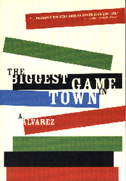
The Biggest Game in Town

Big Deal: One Year as a Professional Poker Player
Four Great Poker Classics You Should Have Read by Now
More than you’d imagine, one generation of poker players has a lot to do with creating a new wave of participants. Sometimes it’s by word of mouth, that powerful form of what’s called Howard Schwartz, the "librarian for gamblers," is the marketing director for Gambler's Book Club in Las Vegas, a position he has held since 1979. Author of hundreds of articles on gambling, his weekly book reviews appear in numerous publications throughout the gaming industry. Howard's website is www.gamblersbook.com “verbal promotion.” An example is a Broadway show given lukewarm reviews or a movie which doesn’t get the attention it needs to succeed. But the shows survive and flourish as one group of fans recommends it to another, and curiosity combined with individualism help both create a tidal wave of participation and often a great hit.
Howard Schwartz, the "librarian for gamblers," is the marketing director for Gambler's Book Club in Las Vegas, a position he has held since 1979. Author of hundreds of articles on gambling, his weekly book reviews appear in numerous publications throughout the gaming industry. Howard's website is www.gamblersbook.com “verbal promotion.” An example is a Broadway show given lukewarm reviews or a movie which doesn’t get the attention it needs to succeed. But the shows survive and flourish as one group of fans recommends it to another, and curiosity combined with individualism help both create a tidal wave of participation and often a great hit.
Here are four poker books, a little of their history and background, which have stood the test of time and have spawned a generation of poker players who discovered them for a variety of reasons:
The Education of a Poker Player by Herbert Yardley (140 pages, paperbound, $14.95). Originally published in 1957, this book was an immediate sensation first because few books on the game existed then and also because of its entertaining stories, strategy and philosophy about the game and the players it attracts. What is unique too is that Yardley was a code breaker for the State Department. Texas Hold'em did not exist in those days, but many home poker games and the popular ones did (draw, stud, split, low ball, for example). Read this one because it created a new generation of players, made the games exciting, and it was so sought after when it went out of print (it’s been in and out of print a half-dozen times in 50 years), people were willing to pay $40 for a battered copy.
Play Poker, Quit Work and Sleep till Noon! (subtitled The Complete Psychology, Mathematics and Tactics of Winning Poker) by John Fox (343 pages, paperbound, $14.95). Originally published in 1977, this intriguing title is still available although some Internet sites list it for $85! The author, a California resident, focuses on high and low draw poker, but it’s his psychological ploys or mind games you can apply to your own style at the table which fascinated poker players 30 years ago. There are 27 sections including those addressing bluffs, table image, when to leave the table, memorizing cards, reading opponents and their hands, importance of position.
I can’t be sure, but I’ll bet Mike Caro’s “tells” book was stimulated by author John Fox’s work.
The Biggest Game in Town by A. Alvarez (188 pages, paperbound, 1983). This book stimulated interest in tournament poker as few have done. Not since Doyle Brunson’s original Super System (published in 1978) did one book focus on the biggest tournament ever—the Binion’s World Series of Poker. Alvarez, who should be in the Poker Hall of Fame for all he’s done for the game, writes about the 1981 tournament; about Las Vegas; the players, their wives and about what money means or represents to big stakes players. His disarming style allowed him to penetrate many players’ “barrier of secrecy” as they offer insights into their own lives—including wins, losses, arrests, origins of slang expressions, tips on survival (in life in general or at the tables).
Alvarez helped make tournament poker a remarkable event to watch or participate in. Since then, more than a dozen books have been published about the World Series of Poker, the city, the action and the players. This one stands out among them all.
Big Deal (A Year as a Professional Poker Player) by Anthony Holden (389 pages, paperbound, $15). Originally published in 1990 and written by a sharp-minded and equally witty British journalist (a good friend of A. Alvarez’s by the way), it too caught on because here, the author, an avid fan of the game who could also write (a rare combination today), incorporates history, strategy, experience with his own money in games in this country and elsewhere. In this book, you were with Holden as he strolled into this club or casino, won, lost, felt his frustration, bad beats and tilts and caught inside information few people were privy to.

